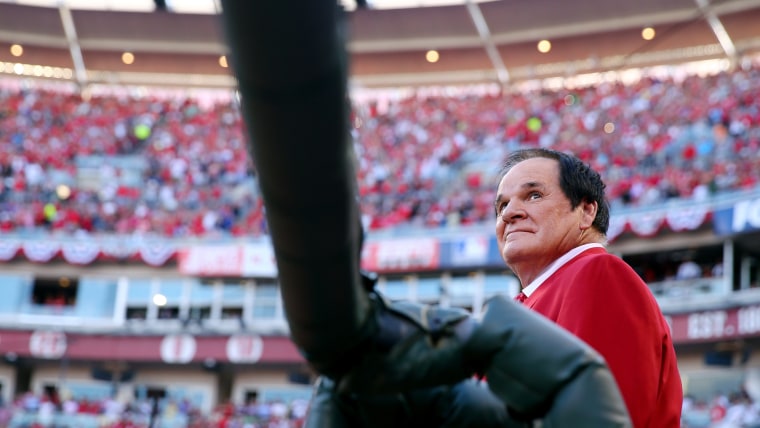Pete Rose, Major League Baseball's all-time hits leader, has lost his bid to reverse a permanent ban from the game, a penalty that has kept him out of the Hall of Fame.
MLB Commissioner Rob Manfred chose not to lift the sanction, imposed in 1989 after Rose was caught betting on games, including those he managed for the Cincinnati Reds, the league announced Monday.
NBC Sports: Commish Blasts Rose to the Stone Age
In his written decision, Manfred indicated that Rose could still not be trusted to tell the truth about his past betting. But Manfred also provided a potential opening for Rose to be included on a future Hall of Fame ballot, saying the reasons for the continued banishment did not necessarily apply to his eligibility for Cooperstown.
Rose lawyer Ray Genco said he and his client were "disappointed" by Manfred's decision and that Rose would speak publicly Tuesday "after he has had time to fully consider it."

Rose has admitted much of the betting and has been trying for years to get the ban overturned. He began petitioning Manfred soon after he took office in January, asking for a chance to show he had taken responsibility for his misdeeds and had "reconfigured" his life, a term invoked by former Commissioner Bart Giamatti after he negotiated Rose's ban 26 years ago.
Manfred said that he reviewed reports from the time of Rose's punishment, and any newly relevant material, including a review of how Rose had conducted himself since then.
The new information included a copy of a notebook that documented bets Rose made on games in the Reds' 1986 season, in which he both played and managed. That notebook was first reported by ESPN last summer.
But Rose apparently blew his interview with the commissioner.
In a September meeting, Rose admitted betting on baseball in 1987 but said he couldn't remember many facts outlined in the league's original findings — called the Dowd Report — that showed evidence of his betting as a player in the two previous seasons, according to Manfred.
Rose also "made assertions concerning his betting habits that were directly contradicted by documentary evidence" — the betting notebook, Manfred said.
"And, significantly, he told me that currently he bets recreationally and legally on horses and sports, including Baseball," Manfred wrote.
That admission came after Rose had initially denied that he still bet on sports, Manfred said.
The commissioner concluded that Rose had not turned his life around.
Manfred said he had "little confidence" that Rose understood his misdeeds or had accepted full responsibility for them — or understood the damage they caused.
"In short, Mr. Rose has not presented credible evidence of a reconfigured life either by an honest acceptance by him of his wrongdoing, so clearly established by the Dowd Report, or by a rigorous, self-aware and sustained program of avoidance by him of all the circumstances that led to his permanent ineligibility in 1989," Manfred wrote.
Manfred did say, however, that he did not believe that the criteria that made Rose unworthy of reinstatement — primarily, the concern that he would break league rules again — were not the same as those for Hall of Fame eligibility.
"Thus, any debate over Mr. Rose's eligibility for the Hall of Fame is one that must take place in a different forum," Manfred wrote.
Despite the continued ban, Rose may take part in "ceremonial activities that present no threat to the integrity of the game," Manfred said.
The New York Times, which first reported the decision, said that Manfred hadn't planning to tell Rose until Thursday, but the scoop forced Manfred to contact Rose on Monday.
Genco said in an email that while Rose and his representatives "may have failed" at making a strong enough case to Manfred, "Pete indeed has meaningfully reconfigured his life — the standard laid out by as Commissioner Giamatti."
Genco went on: "Pete’s fall from grace is without parallel. He recognizes that it was also of his own making. As such, Pete seeks to be judged not simply by the mistakes of his past — but also by the work he has done over the last three decades in taking responsibility for his actions — constantly working to remain disciplined, compassionate and grateful."
